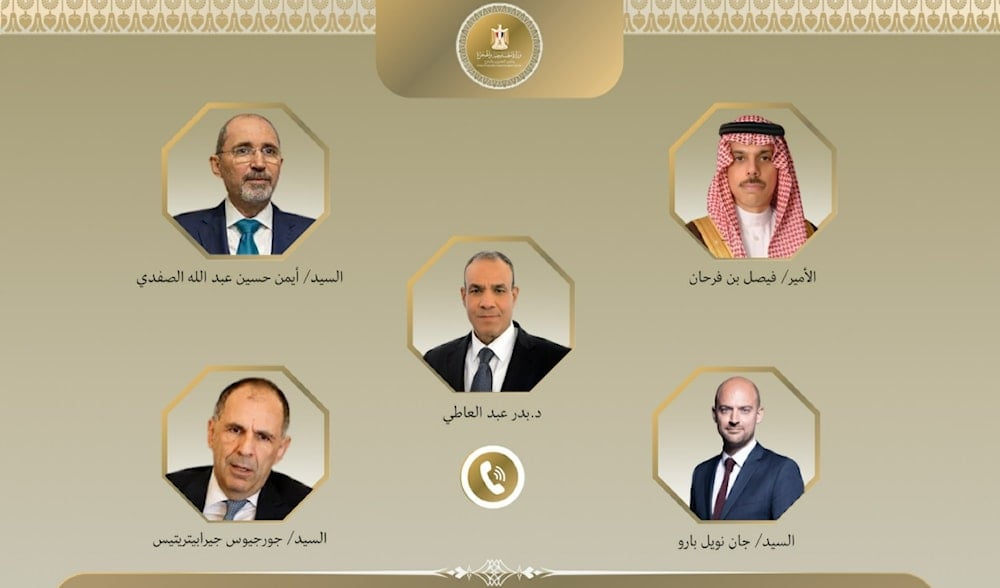Egypt's FM holds regional talks on Gaza reconstruction, Sudan crisis
Egyptian Foreign Minister Badr Abdel Aaty held talks with regional counterparts to advance Gaza reconstruction efforts and Sudan peace initiatives.
-

Egyptian Foreign Minister Badr Abdel Aaty held phone calls with his counterparts, Jean-Noël Barrot of France, Georgios Gerapetritis of Greece, Prince Faisal bin Farhan Al Saud of Saudi Arabia, and Ayman Safadi of Jordan, to discuss developments in Palestine and Sudan and coordinate regional efforts to promote stability and reconstruction (Egyptian Ministry of Foreign Affairs, official Facebook page)
Egyptian Foreign Minister Badr Abdel Aaty held a series of phone calls with his counterparts in France, Greece, Saudi Arabia, and Jordan to discuss the latest developments in Palestine and Sudan, as part of Egypt's ongoing diplomatic efforts to enhance regional and international coordination on key Arab issues.
According to a statement by the Egyptian Ministry of Foreign Affairs, Abdel Aaty spoke on October 26 with French Foreign Minister Jean-Noël Barrot, Greek Foreign Minister Georgios Gerapetritis, Saudi Foreign Minister Prince Faisal bin Farhan Al Saud, and Jordanian Deputy Prime Minister and Foreign Minister Ayman Safadi.
Ceasefire reconstruction diplomacy
The discussions focused largely on the situation in Gaza and the efforts to consolidate the current ceasefire. Abdel Aaty stressed the importance of "building on the outcomes of the historic Sharm El-Sheikh Peace Summit and the Gaza ceasefire agreement, in a way that fulfills the aspirations of the Palestinian people and leads to the establishment of their independent state." He added that it was essential to "move into the second phase of the Gaza ceasefire agreement and begin steps toward early recovery and reconstruction."
Notably, the Egyptian minister made no direct reference to "Israel's" repeated violations of the ceasefire, even as reports of renewed attacks and humanitarian obstruction surfaced. The Palestinian Ministry of Health reported that eight Palestinians were martyred and 13 others injured in the past 48 hours amid continued Israeli operations in Khan Younis and Deir al-Balah.
Al Mayadeen's correspondents said Israeli forces have destroyed residential areas, targeted civilians, and blocked aid convoys, while UN data shows over 80 percent of Gaza City's structures have been destroyed.
Abdel Aaty instead highlighted Egypt's ongoing efforts to promote reconstruction, saying that Cairo will host the International Conference on Early Recovery and Reconstruction of Gaza in November. He described the conference as "a pivotal step toward unifying international efforts to support the Palestinian people and contribute to rebuilding what the war has destroyed, in line with a comprehensive Arab-Islamic plan for early recovery and reconstruction."
Sudan mediation strategy
The talks also addressed the deteriorating situation in Sudan, particularly in El Fasher, which has witnessed widespread violence and humanitarian collapse. Abdel Aaty and his counterparts reaffirmed the need to support regional and international efforts aimed at achieving a ceasefire and a comprehensive political settlement, in line with the outcomes of the recent Sudan Quartet meeting in Washington. They also stressed the importance of coordinating humanitarian aid to ease suffering in the worst-affected areas.
In recent weeks, Egypt has stepped up its diplomatic engagement on Sudan, underscoring its support for state institutions under the Sudanese Armed Forces (SAF) led by Gen. Abdel Fattah al-Burhan. On October 1, Foreign Minister Badr Abdel Aaty met Burhan in Port Sudan, calling for an immediate ceasefire and a Sudanese-led political process within the Quartet framework.
Later, on October 16, President Abdel Fattah el-Sisi reiterated Egypt's commitment to Sudan's unity, sovereignty, and legitimate institutions, rejecting any attempts to create parallel authorities. Speaking at the Aswan Forum on October 19, Abdel Aaty stated that there is "no military solution" to the conflict, calling for an inclusive, Sudanese-owned dialogue as the only path toward stability.
Although Egypt maintains contact with all sides, Cairo's position remains clear: it does not support the Rapid Support Forces (RSF), viewing the group's expansion as a destabilizing threat to state integrity along Egypt's southern border. Its policy focuses on preserving Sudan's unity and sovereignty and discouraging foreign intervention or funding of paramilitary factions, a stance that aligns Cairo more closely with Saudi Arabia's mediation efforts than with the UAE's more assertive approach.
The Egyptian Foreign Ministry said the consultations reflect Cairo's continued leadership in regional diplomacy, reaffirming its commitment to promoting stability through dialogue, reconstruction, and coordinated humanitarian action across both Gaza and Sudan.
Read more: Guterres urges end to foreign interference in Sudan war

 4 Min Read
4 Min Read










